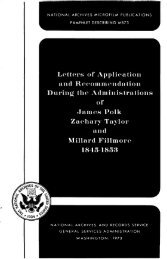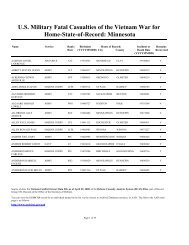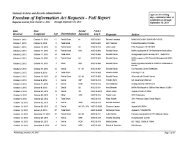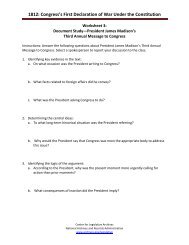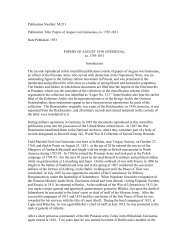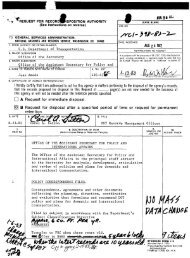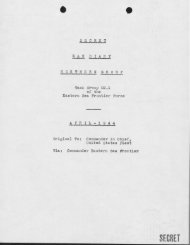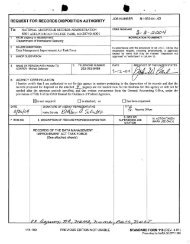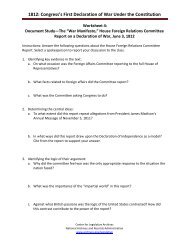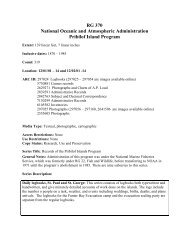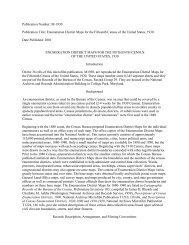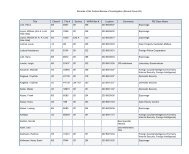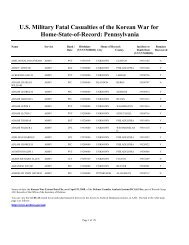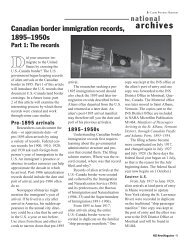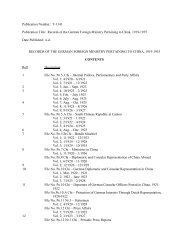HITLER'S SHADOW - National Archives and Records Administration
HITLER'S SHADOW - National Archives and Records Administration
HITLER'S SHADOW - National Archives and Records Administration
You also want an ePaper? Increase the reach of your titles
YUMPU automatically turns print PDFs into web optimized ePapers that Google loves.
Moreover, MI6 argued, B<strong>and</strong>era’s group was “the strongest Ukrainian<br />
organization abroad, is deemed competent to train party cadres, [<strong>and</strong>] build a<br />
morally <strong>and</strong> politically healthy organization….” 57<br />
British officials considered “the possibility <strong>and</strong> desirability of engaging in<br />
cl<strong>and</strong>estine operations in the Soviet Union other than those of a purely intelligencegathering<br />
character.” 58 But the CIA <strong>and</strong> State Department officials were “very<br />
strongly opposed” to London’s idea of returning B<strong>and</strong>era to the Ukraine. B<strong>and</strong>era,<br />
the Americans said, had “lost touch with feelings in the Ukraine, particularly in the<br />
former Polish territories where… the Soviet government had been successful to<br />
a remarkable degree in transforming the mentality of the younger generation.” 59<br />
For the CIA, the best solution for intelligence in the Ukraine was the “political<br />
neutralization of B<strong>and</strong>era as an individual….” 60 The British argued that such<br />
“would lead to a drying up of recruits” <strong>and</strong> “would disrupt British operations…. 61<br />
MI6 disregarded the CIA statement that “B<strong>and</strong>era…is politically unacceptable to<br />
the US Government.”<br />
British operations through B<strong>and</strong>era exp<strong>and</strong>ed. An early 1954 MI6 summary<br />
noted that, “the operational aspect of this [British] collaboration [with B<strong>and</strong>era]<br />
was developing satisfactorily. Gradually a more complete control was obtained<br />
over infiltration operations <strong>and</strong> although the intelligence dividend was low it<br />
was considered worthwhile to proceed….” 62 B<strong>and</strong>era was, according to his<br />
h<strong>and</strong>lers, “a professional underground worker with a terrorist background <strong>and</strong><br />
ruthless notions about the rules of the game…. A b<strong>and</strong>it type if you like, with a<br />
burning patriotism, which provides an ethical background <strong>and</strong> a justification for<br />
his b<strong>and</strong>itry. No better <strong>and</strong> no worse than others of his kind….” 63<br />
From inside the Ukraine, the UHVR rejected B<strong>and</strong>era’s authoritarian approach<br />
<strong>and</strong> dem<strong>and</strong>ed unity in the emigration. In messages brought from the Ukraine<br />
by CIA agents, UHVR insisted in the summer of 1953 that Lebed represented<br />
“the entire Ukrainian liberation movement in the homel<strong>and</strong>.” 64 American <strong>and</strong><br />
British officials tried to reconcile B<strong>and</strong>era to Lebed’s leadership, but B<strong>and</strong>era <strong>and</strong><br />
Stetsko refused. In February 1954 London had enough. “There appeared,” reported<br />
B<strong>and</strong>era’s h<strong>and</strong>lers, “to be no alternative but to break with B<strong>and</strong>era in order to<br />
safeguard the healthy ZCh/OUN elements remaining <strong>and</strong> be able to continue<br />
using them operationally…. The break between us was complete.” MI6 dropped<br />
all agents-in-training still loyal to B<strong>and</strong>era. 65 In July MI6 informed Lebed that it<br />
82 | Collaborators



